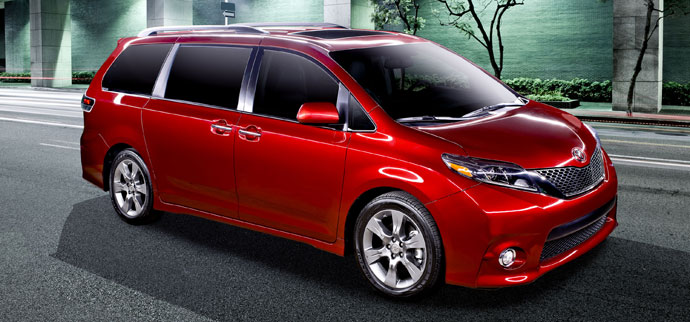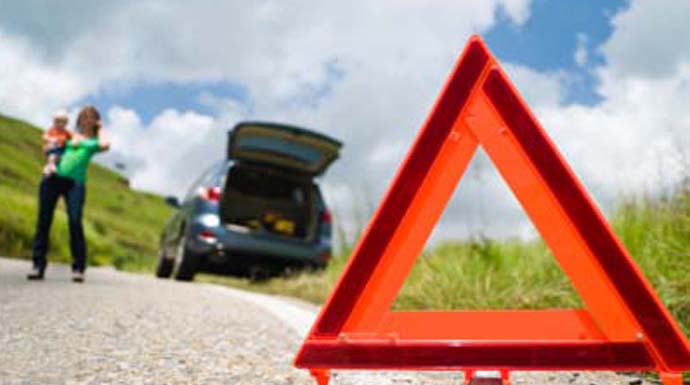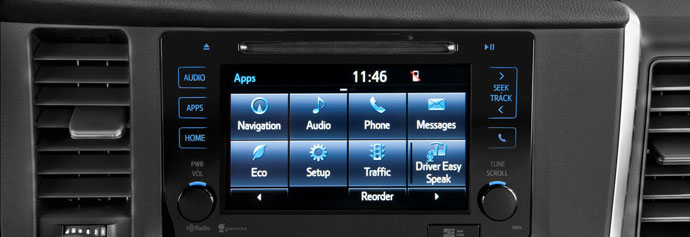With over 15,000 passenger vehicles every day crossing the channel to France by ferry and Euro Tunnel at this time of the year, and a similar number of drivers bracing themselves for squabbling passengers, endless loo stops and the ever-present chorus of “are we there yet?”, an end to such Autoroute Angst may soon be at hand for drivers of the new Toyota Sienna – a family car equipped with a PA system for the driver to shout at address passengers.

When kids are not being scolded, expect the in-car PA system, known as Driver Easy Speak, to be used to parody the in-flight announcements given by airline pilots: We are now cruising at an altitude of three feet at a speed of 70 mph…etc.
Another way to reduce driver stress on European motoring holidays, is to ensure that you have adequate breakdown cover. A fully-comprehensive policy from the ETA covers cars up to 20 years old and costs only £33 for a trip of ten days. Get an instant quote for your holiday breakdown cover.
If you are about to embark on driving holidays to continental Europe, are you aware of recent changes to local laws and in particular, the requirement to carry a breathalyzer while in France?

A few simple steps can help ensure your driving trip to mainland Europe runs smoothly. Much of the best advice is common sense – ensure that your trip is well-planned, that your vehicle is in good working order and that you take your time.
However, rules and regulations vary from country to country – our checklist below is not intended to be comprehensive but covers what we think are the most important points.
Documents you should take with you:
- Driving licence with paper counterpart
- Vehicle registration document (V5)
- Motor insurance certificate
- European breakdown call-out number – 0044 870 77 44 565 for those with ETA European cover
- There are reciprocal health agreements with other countries in the European Economic Area (EEA) and Switzerland. Many travel insurance policies require you to obtain a European Health Insurance Card (EHIC). An EHIC can be obtained online through www.dh.gov.uk/travellers for free. Please be aware that other sites may charge for obtaining an EHIC. The card will entitle you to benefit from the health care arrangements which exist between countries within the EU/EEA or Switzerland.
Emergencies
112 can used to call the emergency services across Europe.
Breakdown cover
If you have breakdown cover with the ETA, make sure your policy includes European cover. If it doesn’t, don’t worry – you can buy from one day to one year’s cover.
Get a quote for European breakdown cover
Breaking down on motorways in France
If you break down on a motorway in France, you have to use the emergency phones at the side of the road to call out the recovery service operated by the French police – nobody else is permitted to attend broken down vehicles on this type of road. You will be charged a fee, but if you ask to be taken to the nearest exit slip, you can ask your own breakdown service provider to take you from there.
French roads, new drivers and speed limits
In France, lower speed limits apply to visiting drivers who have held a driving licence for less than two years (motorways 110kph rather than 130kph, open roads 80kph rather than 90kph and dual carriageways 100kph rather than 110kph)
Do I have to carry a breathalyzer kit when driving in France?
Alcohol limits for driver vary slightly from country to country – the best advice is to avoid drink completely if you are driving. As of July 2012, cars must also carry a breathalyzer approved for use in France. This requirement is not enforceable in law, but drivers may choose to carry one anyway as they are available on the high street from around £2.
Insurance
Don’t assume your car insurance covers your trip abroad – most policies include basic third party cover for driving in Europe but the only way to be certain of your level of cover is to read your policy or contact your provider.
Get a quote for European travel insurance
Child seats
If you have young children and are hiring a car abroad, you might consider taking your own child seat with you. It might seem like a hassle, but the seats provided by the car hire company get a lot of use (and abuse) and to make matters worse, if it is a model you are unfamiliar with you may find the local staff unhelpful – they often refuse to help fit the seats themselves.
GB sticker
A GB sticker on the back of your car is compulsory wherever you are driving in Europe, unless you have number plates that include the GB euro-symbol. If you have neither of these you could receive an on-the-spot fine.
Reflective tabards and warning triangles
France, Italy, Spain, Portugal, Austria and Croatia all require that drivers carry a reflective jacket or tabard for use if the car breaks down. Carry enough for all the passengers in your car.
All cars in Europe must carry a warning triangle, and cars in France must carry a reflective tabard, replacement bulbs and a first aid kit. The ferry companies will gladly remind you of this and charge around £50 for these items if you buy them on board – the equivalent items cost about £10 when bought on the high street or online.
Headlights
You will need to adjust your car’s headlamps to suit driving on the right as failure to do so will dazzle oncoming drivers and could land you with a fine. Headlamp beam converter kits are widely available but Halogen or Xenon headlamps may need adjustment by your dealer. Whatever the local laws, it is prudent to carry spare bulbs.

0 Comments View now